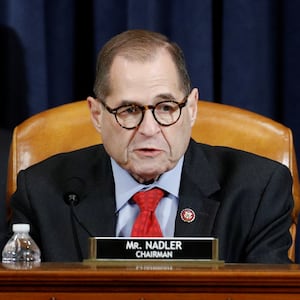The vote to impeach President Trump was mostly smooth and drama-free until about the eighth hour of debate.
Up until that point on Wednesday, more than 100 lawmakers paraded across the floor of the House to deliver minute-long speeches. They gave brief, impassioned, and largely ignored pleas for or against articles of impeachment—and they were usually only noticed when the speeches veered off into hyperbole, such as when a handful of GOP backbenchers gave speeches comparing Democrats’ handling of impeachment to the trial of Jesus Christ and the attack on Pearl Harbor.
For the most part, these lawmakers returned to the same arguments they’ve made for months, only reheated under the bright lights of a historic day in the House chamber.
After snoozing through the afternoon and evening—and some lawmakers literally snoozed—the mood suddenly shifted and the striking partisanship of the moment became naked for all to see.
When the No. 2 House Democrat, Rep. Steny Hoyer of Maryland, said “Democrats did not choose this impeachment,” the dozens of House Republicans listening to his speech on the House floor began laughing and booing him. Hoyer, a veteran lawmaker with longstanding and deep ties across the aisle, snapped his head toward them and addressed the Republicans with a harder, sharper edge. “We voted against it once, we voted against it twice, we voted against it three times,” he said. “We did not want this.”
Then, when it was time for the House Republican leader, Rep. Kevin McCarthy of California, to speak, there were audible groans when he slammed his Democratic colleagues with the “radical socialist” tagline the GOP has tried to stick on them.
As House Intelligence Committee Chairman Adam Schiff (D-CA) began delivering the Democratic closing speech he came under a hail of boos and barbs, but ultimately couldn’t resist lobbing one himself.
“Although you may not act like it,” he told his GOP colleagues, “you may one day be in the majority.”
The House then proceeded to vote to approve two articles of impeachment against Trump, an outcome that has been an inevitability for weeks. It was a bitter, intense moment—in other words, a fitting lead-in to a historic vote.
Ultimately the House voted to impeach Trump, lawmakers approving the first article of impeachment that stated Trump abused his power by pressuring Ukraine to do him political favors—by a margin of 230 to 197. One Democrat, Rep. Collin Peterson (MN), and one soon-to-be Republican, Rep. Jeff Van Drew (NJ) joined every single House Republican in voting no. Rep. Tulsi Gabbard, the Hawaii Democrat and 2020 presidential candidate, voted “present.”
The second article of impeachment, which charged Trump with obstruction of congressional investigation, passed shortly afterward by a margin of 229 to 198—with Rep. Jared Golden, a Maine Democrat, defecting to the no column for the second article.
When it was over, Republicans chanted “four more years” as they headed off the House floor and into an entirely different universe of facts and politics than their colleagues. Democrats stood somberly—under instructions from party leadership not to rejoice—and took in a vote many of them spent the day insisting they never wanted to take.
Huddling near the back of the House floor as votes were cast was a group of freshman Democrats who leapt into impeachment together. In September, the seven of them—all from military or national security backgrounds, all from purple or outright red districts—wrote a joint op-ed in the Washington Post calling for an impeachment inquiry after the whistleblower complaint broke.
The freshmen Democrats long resisted impeachment but came into it together. And on Wednesday, they went out together—literally exiting the building in a group.
One of the members of the group, Rep. Abigail Spanberger, did not have many words for the occasion. “It’s a sad day for the U.S.,” said the freshman Democrat from a Trump-won district in Virginia. “It’s just a sad day.”
The House vote officially ends the Democratic-run chamber’s role in the impeachment process. The GOP-controlled Senate is poised to take up its duty to conduct the trial to either acquit or convict the president, with House members serving as prosecutors, Trump’s lawyers as his defense, and senators as the jury.
But in a press conference after the vote, Speaker Nancy Pelosi (D-CA) refused to answer questions about what she will do next, only saying she will send articles of impeachment to Sen. Mitch McConnell’s Senate if she is assured there will be a fair trial.
Spanberger and her cohort were seven of more than 30 House Democrats representing districts Trump won—many of whom were loath to even touch impeachment until the Ukraine scandal came along— who voted for impeachment, fully knowing that this might mean the end of their political careers.
Speaking the language of duty and Constitution before the vote, their moves amounted to a leap of faith that their constituents will ultimately reward them for taking a principled stand for something they believe in—even if it is to impeach a president they support—rather than punish them.
And if they get punished, well, so be it. A YOLO attitude has prevailed among some lawmakers who are saying if they lose their seats over their impeachment vote, it was all worth it.
Rep. Elissa Slotkin (D-MI), who wrote in an op-ed announcing her decision to impeach that “over the past few months, I’ve been told more times that I can count that the vote I’ll be casting this week will mark the end of my short political career. That may be.”
Rep. Dean Phillips (D-MN) was even more blunt with his assessment.
“In all likelihood, some of us are gonna lose our jobs over it,” Phillips told Vice News.
A Democrat in one of the toughest political spots, Rep. Anthony Brindisi (D-NY), told The Daily Beast he wouldn’t call his decision a leap of faith.
“I think that most people want their representative to just vote their conscience and do the right thing, not what is politically expedient,” said the congressman, who represents an upstate New York district that Trump won by nearly 16 points.
Brindisi predicted that come next November, his constituents will remember his work on other issues—like manufacturing and agriculture—than his Wednesday vote to impeach. “I believe that, at least in the community that I represent, people are more concerned about the kitchen table issues as opposed to impeachment,” he said.
Another, Rep. Joe Cunningham, who represents a South Carolina district that’s long been solidly GOP turf, insisted “politics did not enter into the calculus.”
“I mean there's backlash with every vote we take,” he said. “This is kind of what we sign up for. People send us up here to digest all the facts and call balls and strikes and do the right thing.”
Though there were only a few cracks in Democrats’ impeachment firewall, the House GOP—which has done its part to quash any of Wednesday’s suspense by wrangling their lawmakers lock-step behind the president—has taunted these lawmakers, saying they’ve ensured they will be out of jobs come January 2021. Republican campaign groups are already beginning an aggressive effort to target them specifically, and many of the lawmakers have already been on the receiving end of millions of dollars in attack ads.
During the impeachment debate that dominated the House floor on Wednesday, Republicans used their time to hammer home the idea that Democrats were hammering the nail in their political coffins.
“The voters will remember next November what you’re doing this December,” said Rep. Mike Kelly (R-PA). Then invoking the Japanese attack on Pearl Harbor, Kelly said that “this is a day that will live in infamy.”
Polling on impeachment in key races has been limited, but an initial survey—one commissioned by the Trump campaign—showed a surprisingly high level of support for impeachment in a district the president won handily. In Rep. Kendra Horn’s Oklahoma City-area district—which Trump carried by 13 points—45 percent of voters backed impeachment, compared to 52 percent against. It’s an encouraging sign to Democrats who face more favorable districts.
Democrats insist that it’s not only their own members that will pay the price for their impeachment votes. But few of them wanted to talk about the politics and pretty much all of them wanted to head home after a long day—except for one.
Off the House floor after the vote, Jeff Van Drew stood in a hallway off the House floor and held court, surrounded by a dozen reporters. As he kept them hanging on his next move out of his self-inflicted political limbo, his Democratic colleagues—or soon-to-be former colleagues—walked by and rolled their eyes.








